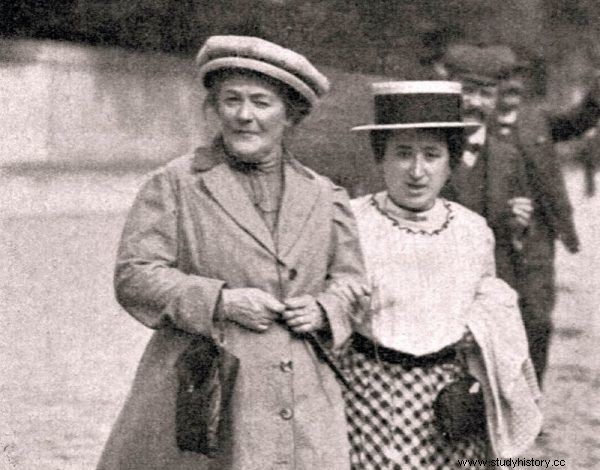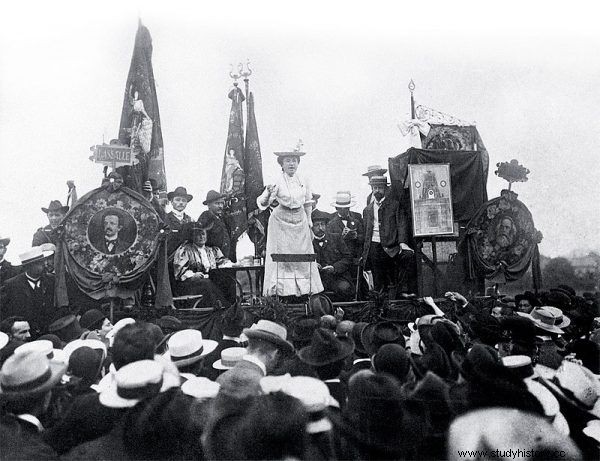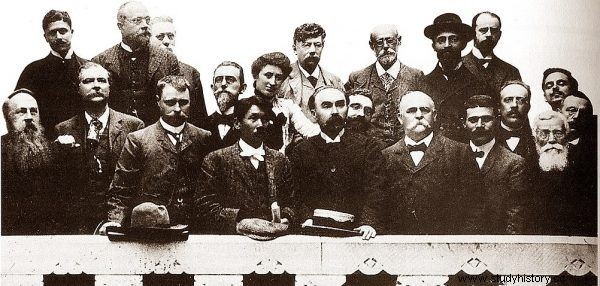In Poland, this outstanding, world-famous intellectual does not have the best press. Although she died before the Bolsheviks became entrenched in power, last year she fell victim to the decommunization law:a plaque commemorating her was chained. Why do Poles dislike her - and is it really right?
"After her murder, both sides of the barricade, revolutionists and conservatives, breathed a sigh of relief," wrote her biographer Elizabeth Ettinger of Rosa Luxemburg (actually:Rozalia Luksenburg). Almost everyone was afraid of the sharp language of the Polish activist. And rightly so, because she did not miss the opportunity to point out someone's error, hypocrisy or simply stupidity.
And the worst part was that the criticisms she voiced most often hit the spot. Luxembourg, not only perfectly educated, but also "furiously intelligent, bright and witty" (as another researcher of her work, Helen Scott, put it), she was able to recognize like no other when someone deviated from their desired goal:socialism.
Traitor of the nation?
The mere involvement of many Poles in the workers' movement would probably consider it sufficient reason to look at the "Red Rose" at least with suspicion. For Zamościanka, born on March 5, 1871 - as Andrzej Fedorowicz argues in the book "Rebels" - Marxism, however, was a natural choice:"It seemed then that it was impossible to explain in a simpler and more logical way what was going on in the economy and social life in the second half of the nineteenth century."
Indeed, Rose discovered Karl Marx's "Capital" very early on, the then "Rebel Bible". In Warsaw, where her family moved in 1873, she was able to observe how successive initiatives taken by revolutionary activists fell under the blows of the tsarist police. She herself joined the movement when she was seventeen, helping to rebuild the "Proletariat", which had been broken two years earlier. Soon after, she had to flee the country. She was transported across the border by a companion from the conspiracy - had a limp since childhood and a few kilometers before the crossing she lost her strength .

Luxembourg had a limp from childhood. Pictured with the feminist Klara Zetkin (left), 1910.
She returned to Warsaw only once, briefly, in 1905, wanting to be as close as possible to the ongoing riots in Russia. Even then, although she had used a false surname, she was quickly exposed. Together with her longtime partner, Leon Jogiches, she was sent to prison. Relatives managed to collect money for gigantic bribes for the guards. Then she left Congress Poland for good.
It was "present" in the homeland only through the Social Democracy of the Kingdom of Poland and Lithuania, which it co-founded, a party remembered mainly for its refusal to support the struggle for the rebirth of the Republic of Poland. No wonder that Róża is also mentioned in Poland as "a protocommunist whose stubborn opposition to Polish independence translated into her reputation as a traitor to the nation," as the author of the Luxembourg blog, Rory Castle, put it.
But did she really deserve this? The historian of the labor movement, Professor Feliks Tych, believed that her position was after all more complicated:
Rosa Luxemburg argued that Poland had the right to a language, schools, and unfettered culture. In her opinion, however, independence could only be achieved thanks to a great war, that is, a great slaughter. And so it happened. She also thought that the world had gotten used to the fact that Poland was not on the map, and European states should merge into one pacifist federation . For her, wars were the greatest threat to humanity. Indeed, both world wars claimed millions of people (…).
Her resistance to independence was largely due to concern that as few people as possible were killed. She also believed that the social structure of Poland at that time - the unenlightened peasantry plus the domination of capitalists - would not help improve the situation of the poor.

Economist and Marxist
The flight from Poland in 1888 became the beginning of a new life for Róża. In Zurich, where she ended up, women could study on an equal footing with men. The atmosphere was so relaxed that Luxembourg fully developed its passion for polemics. It was completely different in Warsaw - a young student for "rebellious attitude" was refused a gold medal in the gymnasium , and this despite excellent academic results.
From the initially chosen zoology, she quickly moved to economics, philosophy and law. She proved to be an exceptionally active student. She was especially appreciated by professor Julius Wolf, who offered her to write under his doctorate. She defended her thesis in 1897, entitled "Industry Development in Poland". Thus, she became the first Polish woman with a doctorate in economics, and the second Polish woman with a doctorate .
During this time, she was slowly gaining fame in the socialist movement as an inexorable speaker and journalist. Its strength was already felt when it appeared at the Congress of the Second International in Zurich in 1893. The position of Luxemburg was then questioned by Ignacy Daszyński, who wanted to refuse her participation in the meeting. How did Róża react? This is how the whole thing is described by Andrzej Fedorowicz in the book "Rebels" :
(...) without asking anyone, she climbed onto a chair and gave a hot speech. Straight ahead, she saw the figures of European social democracy:Frederick Engels, Grigory Plekhanov, and Wilhelm Liebknecht. Each of them could put out a rebellious rebel with one word. However, the veterans of the movement listened with interest to her arguments.
Daszyński finally managed to exclude his opponent from the meeting, but it was too late - she left an indelible impression.

The speeches of Rosa Luxemburg made a great impression on the audience. Photo from 1907.
"Every tear shed is a crime"
Soon after defending her doctorate, Luxembourg wanted to go out into the water. Switzerland remained - at least in her opinion - aloof from the socialist movement. She chose Germany. In order to be able to leave safely, she married a fictitious wedding with the son of her hosts from Zurich, Gustaw Lubeck. They divorced shortly after. This marriage had little impact on the real relationship with the love of her life - Jogiches. And it finally fell apart, but only after many years, around 1907.
In Berlin, Róża gradually strengthened her position in the workers' movement. She became involved in the activities of the Social Democratic Party of Germany, taking part in the most heated discussions of her time. She stood against the next senior members of the labor movement:Edward Bernstein, Karl Kautsky, and at the end of her life - also Vladimir Lenin.
The latter was criticized especially for the tendency to over-centralize and bureaucratize the movement. "Freedom is always freedom for those who think differently" - she wrote in 1918 in a book devoted to the revolution in Russia. Perhaps it was almost a prophetic statement that made "Luxembourgism" fiercely fought in the USSR under Stalin.

Rosa Luxemburg quickly became one of the main activists of the Second International.
At the same time, the more tense the atmosphere in war-seeking Europe became, the louder Luxembourg called to resist militarist tendencies. The authorities' reaction was only a matter of time. As Andrzej Fedorowicz reports in the book "Rebels" :
She was sentenced to a year in prison for inciting disobedience to the state, but before the sentence became final, she made another series of attacks against the army. For the Prussian Ministry of War, the speech in Freiburg turned out to be a stumbling block, when Rosa Luxemburg described the abuse of soldiers in the barracks in front of a crowd of many thousands.
Her trial turned out to be a disgrace for the army. Nine hundred and twenty-two men expressed their readiness to appear as defense witnesses to confirm the truth of the defendant's words . Surprised by this turn of events, the judges interrupted the trial, which was never resumed. The German army never forgot this humiliation.
Despite this single success, Róża stayed in prison with short breaks almost from the beginning of the war. However, she did not give up her activity - she organized the Spartacus Association with Karl Liebknecht from behind bars. When she was released in November 1918, she devoted herself fully to "revolutionary" work, although she was not a supporter of hastening the insurgency.
The uprising that broke out on January 5, 1919 surprised her. “We must tear down the whole world, but every tear shed is a crime. A man who rushes somewhere and is squashed by a bug, commits a crime "- she warned in one of her letters.

She did not live to see the end of the spurt. The German authorities organized a real hunt for Spartacist leaders. Neither Luxembourg nor Liebknecht, who were captured on January 15, was going to be released. A Polish woman was killed with a pistol shot and her body was thrown into the sewer. They were found only a few months later, at the turn of May and June. The perpetrators were never punished .
"Rosa Luxemburg was one of the most original figures ever to participate in the socialist movement," judge Peter Hudis and Kevin B. Anderson, who prepared a new edition of her texts at the beginning of the twenty-first millennium. In the West, the Pole still arouses interest today. On the other hand, in her homeland, with which she felt closely connected until the end of her life, traces of her are rather being removed.
Check where to buy “Rebels. Polish women who did what they wanted ":
